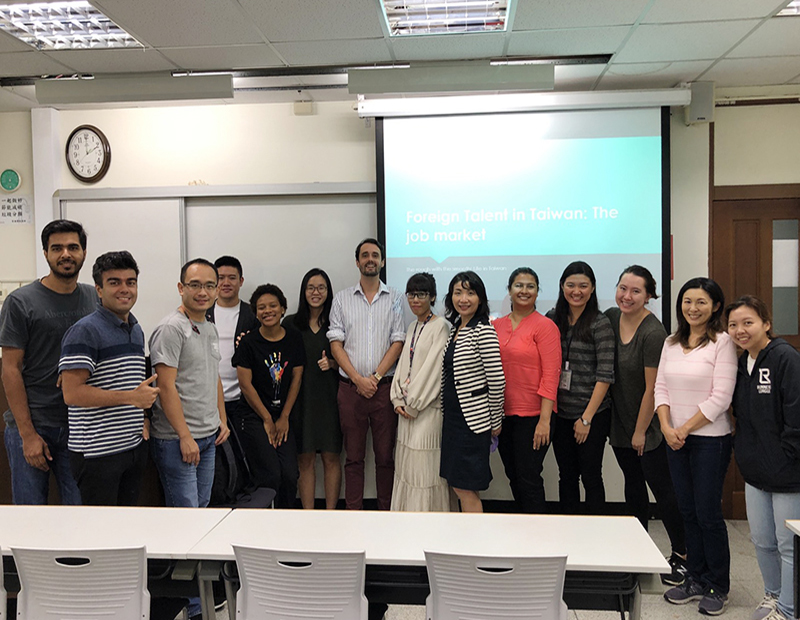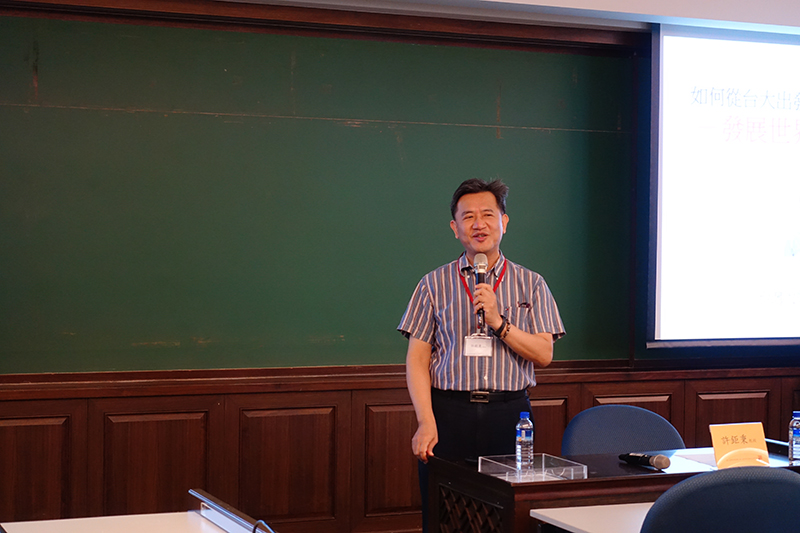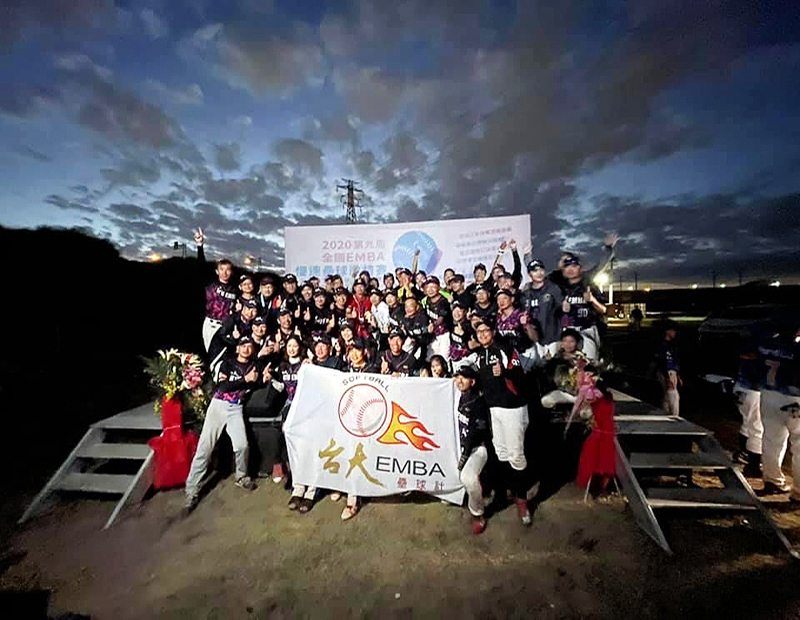在台灣的外國人才:如何面對本土就業市場的挑戰
國際事務室暨GMBA辦公室
撰文者/會計系一年級任采蓁 GMBA二年級 曾真真 Sheena Lim
一週的開始是以參加非常有意義的研討會,這個感覺真的很棒! 9月28日GMBA辦公室為GMBA的同學們安排了一次難能可貴的研討會——「在台灣的外國人才:如何面對本土就業市場的挑戰 」。隨著GMBA外籍學生的人數不斷增長,這次研討會旨在提供他們了解台灣就業市場的文化與管道。首先,GMBA楊嘉嫻副執行長及陳依瑾幹事為活動揭開序幕,他們誠摯歡迎來參加的學生,同時介紹今日特聘講師的背景資料。
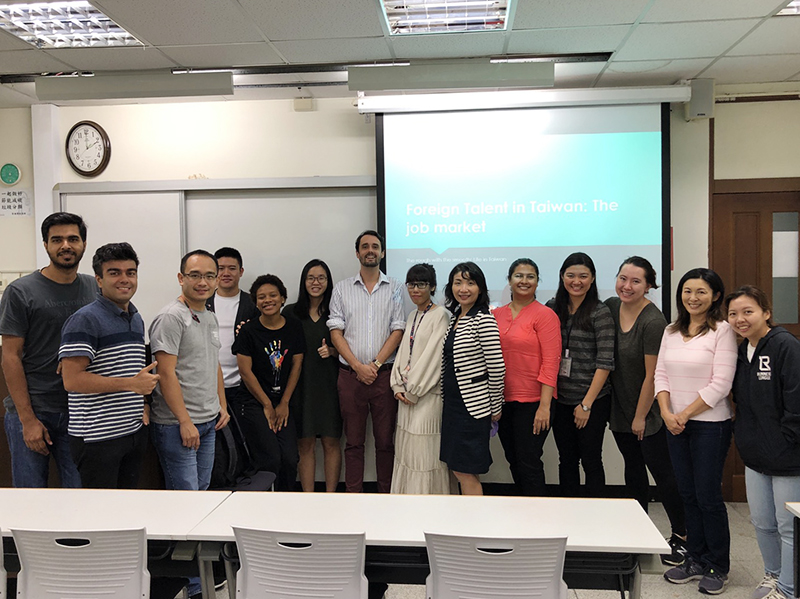
此次GMBA非常榮幸,能夠邀請到台灣Paul Wright Group的人資顧問Alan McIvor來台大進行演講,Alan McIvor先生於2008年完成他在聖安德魯斯大學的碩士學位後來到台灣工作,2013年他前往上海擴展自己的事業,不過後來又在一番斟酌後決定回到台灣。回台後,他先於伯樂亞太管理顧問公司豐富自己的工作經驗,才加入目前任職的公司——Paul Wright Group。Alan在研討會開始之前,先要求學生們簡短的自我介紹,在了解他們的成長背景之後,他對於GMBA擁有豐富多元的學生族群感到驚艷。
根據統計,目前在台工作的外國人數約略有785,341人,而其中僅65,854人為白領階級,其餘皆為藍領階級。Alan在演講中問了在場學生一個令人發想的問題:「為什麼台灣的就業市場在聘僱外國人才是如此困難重重、極富挑戰性呢?」他認為理由有許多個,例如:雇主普遍缺乏雇用外國人的經驗、申請工作簽證的疑慮與問題、起薪標準的不同,以及台灣在過往的殖民歷史中所扮演的角色等等。他的演說讓學生們對於未來即將面臨的就業情況有一個初步的了解,也理解到尋求工作並不如自己想像中的容易。儘管未來有許多挑戰等著學生們,Alan仍從他個人的創業經驗之中分享了許多實用的技巧與建議,希望學生們不要因此感到氣餒或挫折。
首先,Alan給予想留在台灣工作的學生們的第一個中肯建議便是「學習中文」。若想在台灣的公司(無論是外商或是本土企業)工作,使用中文溝通(就算無法如母語使用者一般流利)無疑是必要的能力。他也補充說明:在職場文化中,能被團隊的其他成員認同是非常重要的,而使用中文與其他同事對話、合作絕對是一個拉近距離的好方法。接著,他強調人脈的重要性,因為它能打開許多機會的大門,舉一個最簡單的例子:在台灣尋求工作最簡單的方法便是透過他人的介紹與推薦,因此認識多一點人永遠不會是一件壞事。再來,他呼籲學生們透過實習、工讀機會或是參與線上課程等等,以豐富自己的履歷內容。而恰巧GMBA在規劃實習、工讀,以及線上課程正好為學生們提供了許多磨練與實踐的機會。例如,外籍生隨時都能夠跟台灣學生練習中文、透過參與GMBA舉辦的各式活動認識不同的人、申請實習與工讀機會。除此之外,Alan也建議大家應該採取積極的態度在尋求工作機會上,而非消極地投遞履歷並等待回覆,意即主動聯絡各企業的人力資源部門及管理階層,以求有可能面試的機會。他建議學生們可以透過LinkedIn的平台,用簡潔明瞭的訊息介紹自己、為自己開創各種契機。最後,他提醒「被拒絕」是尋求工作的必經過程,儘管求職路上會是非常艱辛,學生們仍必須堅持不懈、保持創新。
這場有趣的互動式講座最後在Q&A之下結束,學生們進一步詢問Alan有關尋求工作的建議,而他也非常慷慨、熱心地解答。相信經過今日的研討會,學生們能從Alan豐富的經驗中汲取寶貴知識,並在踏入職場前做好萬全的準備。
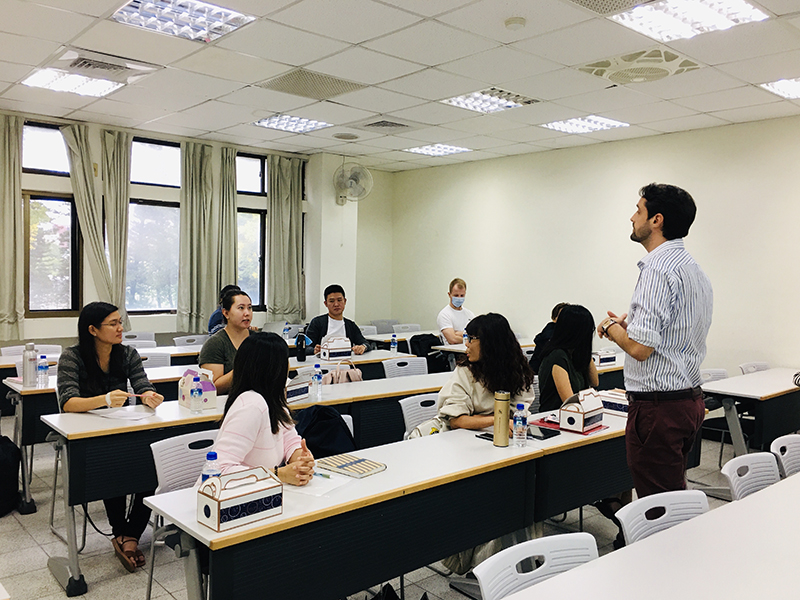 |
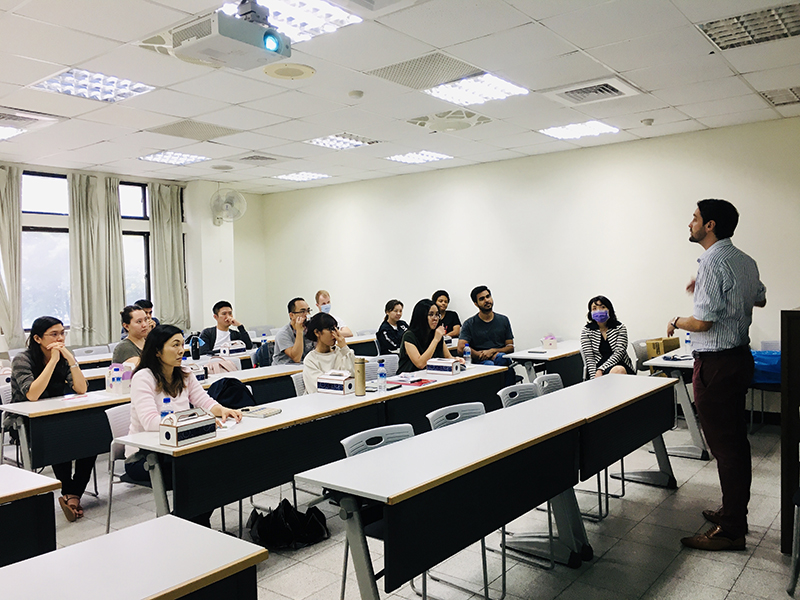 |
Foreign Talent in Taiwan
Written by GMBA student Sheena Lim
What an enhancing way to start the week! On Monday, 28 September 2020, the GMBA office organized a seminar with the topic “Foreign Talent in Taiwan: The Job Market, the Rough with the Smooth”. As the number of GMBA foreign students keeps on increasing each academic year, this is a wonderful opportunity to learn more about Taiwan’s job market and culture. Celia Yang and Yvonne Chen of the GMBA office welcomed and introduced our guest speaker.
The GMBA students who attended the seminar were privileged to have Alan McIvor, a Practice Leader at Paul Wright Group here in Taiwan. He came to Taiwan after finishing his Master’s Degree at the University of St. Andrew’s in 2008. He relocated to Shanghai in 2013 to further his career but decided to return to Taiwan after a couple of years and has experienced working for Bo Le Associates before joining his current company, the Paul Wright Group. The workshop started with the speaker asking the students to introduce themselves and found it very interesting that the GMBA students have very diverse work backgrounds.
The total number of foreigners currently working in Taiwan is approximately 785,341 and according to statistical data, out of the total population of foreign workers, only 65,854 are white-collared workers while the rest are blue-collared workers. A very relevant question was asked by the speaker, “Why is the job market in Taiwan challenging for foreign talent?” Possible factors that he thinks might have affected this are the lack of hiring experience, visa situation, misconceptions in salary, and Taiwan’s colonization history among others. From his sharing, the foreign students came to realize the reality of how hard job hunting will be. But the speaker also gave practical tips and advices which he also used himself when he was starting his career in Taiwan.
For those who plan to stay and work in Taiwan, his number one advice is to learn Chinese. Aspiring to work for a company in Taiwan, whether in a local or foreign company, it is actually self-explanatory why one should learn Chinese even if it’s not in a native level. The speaker shared that in the working culture, it is important that you can be considered as part of the group, and one of the ways to achieve that is to be able to speak the language of your peers. Second, he strongly emphasized the importance of networking as it can open a lot of doors for you. According to the speaker, one of the best ways to get a job in the Taiwan market is through referrals, so the more people you know the better. Another tip that he shared with the students is to improve their curricular vitae by doing online course works, internships, or part-time projects. Fortunately, students can follow and apply the first three of his tips through the GMBA program where foreign students can practice Chinese with their local classmates, attend GMBA’s various networking events, and apply for part-time job opportunities. Lastly, the speaker advised everyone to be more aggressive in job hunting. For him, sending out CVs and waiting for callbacks is a very passive way of looking for a job. To aggressively look for job openings, he shared that aspiring applicants should make direct contacts. Look for HR specialists or managers from the company that you want to work for, add them in LinkedIn, and introduce yourself and giving your elevated pitch through a concise message. He also reminded everyone that rejection is part of job searching and that students must persevere and be creative.
The fun and engaging seminar ended with a Q and A where some students asked about career advices and the speaker answering them honestly and generously. Being aware of the challenges that await students is very helpful to assist them in making proper preparations in their job search journey.

